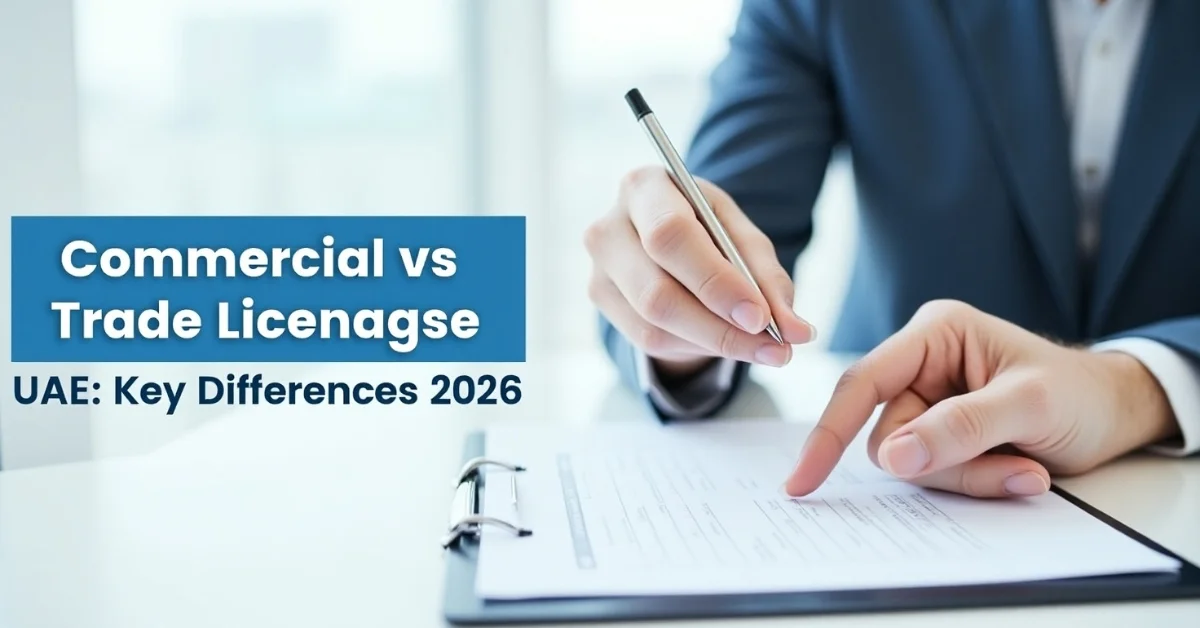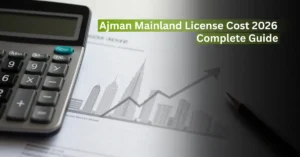Starting a business in the UAE is one of the most attractive options for entrepreneurs in 2026. With its tax-friendly environment, strong global trade links, and simplified company setup processes, the UAE continues to be a hub for international investors. But before you launch your company, choosing the right business license is crucial.
The most common debate is commercial vs trade license. Many entrepreneurs use these terms interchangeably, but they are not the same. The differences directly impact your business activities, costs, ownership rights, and even visa eligibility. Understanding these distinctions will help you make the right decision and avoid costly mistakes during your setup journey.
Commercial vs Trade License
| Criteria | Commercial License | Trade License |
| License Purpose | For companies engaged in trading, import/export, retail, or wholesale of goods | For general trading or a wide variety of activities under one license |
| Typical Activities | Retail shops, e-commerce, import/export, wholesale distribution | Multiple trading activities (textiles, food, electronics, etc.) |
| Ownership & Liability | 100% foreign ownership possible in most cases (mainland & free zones) | 100% foreign ownership in many activities; depends on jurisdiction |
| Visa & Sponsorship | Eligible to sponsor staff visas and UAE business visas for investors | Same visa benefits; quotas depend on office size & location |
| Fees & Renewal | Similar range; trade license costs can vary by the scope of activities | Similar range; trade license costs can vary by scope of activities |
What is a Commercial License?
A commercial license in the UAE is issued to companies engaged in buying and selling goods, whether within the local market or internationally. It covers a wide range of trading activities, such as general trading, retail shops, import-export businesses, e-commerce, and logistics. Holding a commercial license also allows you to open a corporate bank account, lease office space, and sponsor employee visas. In 2026, commercial licenses remain one of the most popular options because they provide flexibility for businesses that deal with physical products or large-scale trading.
1. Common Activities & Industry Examples
A commercial license is designed for companies involved in trading goods or services. Typical activities include:
- E-commerce businesses selling products online
- Import and export companies
- Supermarkets and retail shops
- Wholesale distribution companies
- Logistics and trading firms
If your business model revolves around buying, selling, or distributing products, you’ll likely need a commercial license.
2. Free Zone vs Mainland Commercial License Differences
- Free Zone: Ideal for entrepreneurs focusing on international trade. Benefits include 100% foreign ownership, tax exemptions, and simplified customs. However, free zone companies must appoint a distributor to sell directly in the UAE mainland.
- Mainland: Best for businesses that want to trade directly within the UAE. Mainland commercial licenses often give more flexibility with office locations and government contracts.
3. Step-by-Step: How to Apply in 2026
- Choose your business activity from the approved DED (Dubai Department of Economy and Tourism) or free zone list.
- Decide between a mainland and free zone setup.
- Reserve a trade name.
- Prepare documents: passport copy, Emirates ID (if applicable), and NOC letter (if required).
- Apply for initial approval.
- Rent or lease office space (Ejari for mainland companies).
- Submit documents and pay fees.
- Receive your commercial license.
Ripple Business Setup handles each of these steps, ensuring your application is error-free and approved quickly.
What is a Trade License?
A trade license in the UAE refers more broadly to the legal permission required for any type of business activity. While people often confuse trade licenses with commercial licenses, they are not identical. A trade license can include different categories, such as commercial, professional, or industrial, depending on the nature of the activity.
For example, a consultancy may operate under a professional trade license, while a manufacturer may require an industrial trade license. In simple terms, a trade license is the umbrella term, while a commercial license is a specific type within that category.
1. Are “Trade License” and “Commercial License” the Same?
In practice, many people call any business license a “trade license.” However, the official trade license is broader and usually applies to companies conducting general trading activities.
In Dubai, for example, a general trade license allows you to trade multiple products, from textiles and electronics to food items, under one license.
2. When to Choose Trade vs Commercial
- Choose a commercial license if you’re focusing on a specific product category (like electronics import/export).
- Choose a trade license if you want flexibility to trade a wide variety of goods without restrictions.
Ownership, Liability & Sponsorship | What Matters in 2026
1. 2026 Changes & Implications
The UAE continues to allow 100% foreign ownership for most activities, making it easier for entrepreneurs to set up mainland companies without local sponsors. In 2026, updated rules on:
- Corporate tax (9%): applies to profits above AED 375,000.
- Economic Substance Regulations (ESR): compliance is mandatory for certain trading activities.
- Ultimate Beneficial Owner (UBO) disclosure: transparency remains a priority.
2. Visa Quota Examples
- Small office (200 sq. ft.): usually 2–3 employee visas.
- Medium office (400–500 sq. ft.): up to 6–8 employee visas.
- Larger warehouses or offices: higher quota based on space.
Both licenses allow you to apply for UAE business visas, sponsor family members, and apply for residence permits.
Costs, Timelines & Hidden Fees
1. Typical First-Year Costs
- License registration: AED 10,000 – 15,000 (varies by zone)
- Office rent/Ejari: AED 8,000 – 15,000
- PRO services: AED 3,000 – 5,000
- Miscellaneous admin (approvals, name reservation, etc.): AED 1,000 – 2,000
2. Ongoing Costs and Renewal
- Annual renewal: AED 12,000 – 25,000
- Visa renewal (per person): approx. AED 3,500 – 5,000
- Compliance filings (VAT, ESR, UBO): AED 2,000 – 4,000 annually
Hidden fees often come from late renewals, Ejari changes, or PRO errors. Ripple Business Setup helps you avoid unnecessary costs.
5 Practical Case Studies
- E-commerce Importer: A Dubai-based online fashion store imports clothes from Turkey under a commercial license. Ripple Business Setup helped secure its license in 14 days.
- Consultancy: A marketing consultancy required a trade/professional license instead of a commercial license. Ripple Business Setup guided them to the right choice, saving future penalties.
- Free Zone Exporter: A food exporter in the Sharjah Free Zone chose a trade license for broader product coverage. Ripple Business Setup managed customs code registration.
- Retail Shop Owner: A supermarket chain expanded across Dubai using a mainland commercial license. Ripple Business Setup handled Ejari and visa quotas.
- Freelancer Transition: A graphic designer grew into a small agency and upgraded from a freelance permit to a trade license with Ripple Business Setup support.
How Ripple Business Setup Helps You Set Up
1. Document Preparation
We collect and prepare all necessary documents, thereby reducing the risk of rejection.
2. License Application & Follow-Up
Our PRO team submits your application and manages approvals until you receive your license.
3. Visa Processing & Bank Account Support
From employee visas to opening a business bank account, Ripple Business Setup ensures smooth execution.
4. Post-Setup Compliance & Accounting
We provide ongoing compliance support (VAT, ESR, renewals) so your company remains in good standing.
FAQ
Q1: Can I switch license type later?
Yes, but you’ll need to amend your trade license through the DED or free zone authority.
Q2: Which license is better for e-commerce in 2026?
A commercial license is best for online stores, as it covers product-specific trading.
Q3: What’s the difference between a trade, commercial, and professional license?
- Trade license: general trading across multiple products.
- Commercial license: specific trading activities.
- Professional license: services like consultancy or freelancing.
Q4: Do I need a local sponsor in 2026?
Not for most activities, 100% foreign ownership is allowed.
Q5: How long does the process take?
On average, 7–14 working days, depending on the business activity.
Q7: What documents are required for a Dubai visa?
Passport copy, photo, medical test results, Emirates ID, and employment/ownership proof.
Q8: Are there new visa rules in the UAE in 2026?
Yes, business visit visas now allow flexible entry and longer durations, making it easier to explore opportunities before committing.
Related Topics:






